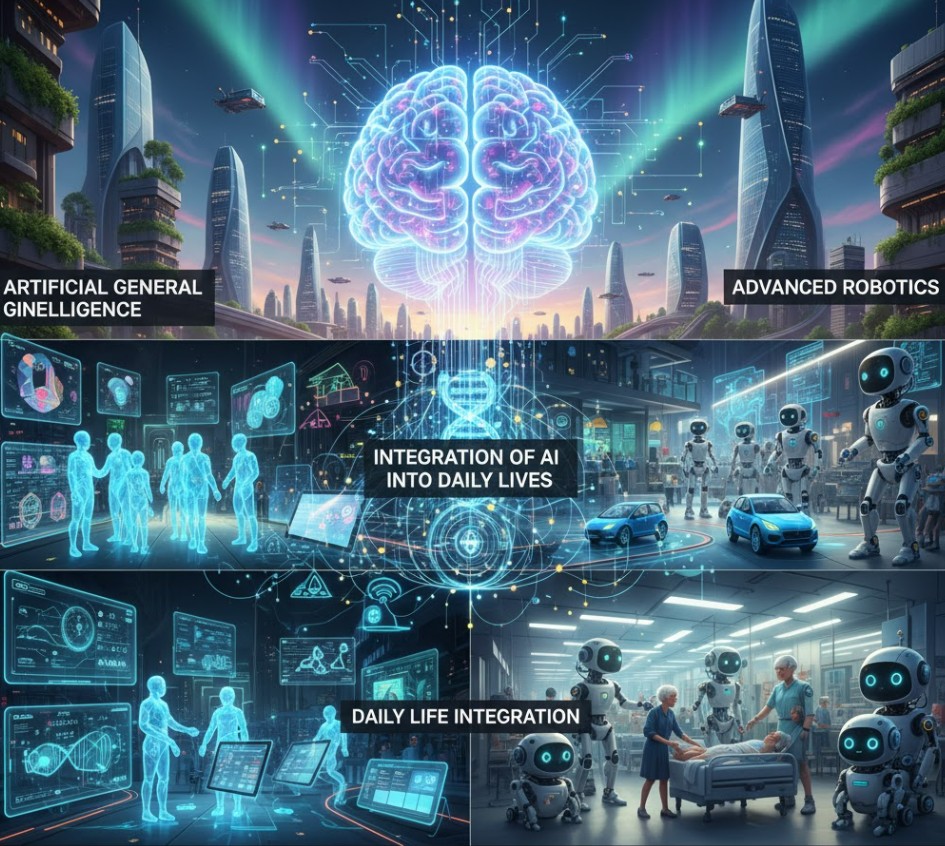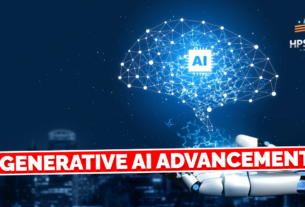Artificial Intelligence (AI) is no longer a futuristic concept confined to science fiction; it is the most transformative technology of our time, rapidly reshaping society, the economy, and the very definition of human capability. The future of AI is not a single destination but a complex, multi-faceted journey driven by exponential technological growth, characterized by profound potential for good, and shadowed by significant ethical and existential challenges.
Understanding this future requires looking beyond current applications to the next great leaps: the rise of more sophisticated models, the potential for Artificial General Intelligence (AGI), and the critical need for robust governance.
Key Technological Trends Shaping the Horizon
The immediate future of AI will be shaped by the continued advancement of several key technological trends that are making AI more powerful, more accessible, and more integrated into daily life.
1. The Proliferation of Generative AI (GenAI) and Multimodal Models
Generative AI, exemplified by large language models (LLMs) like those powering sophisticated chatbots and image generators, has democratized AI. The trend is moving rapidly toward multimodal AI, which can seamlessly process and generate information across different data types—text, images, audio, and video—simultaneously. This will lead to far more intuitive and powerful applications, enabling machines to understand and interact with the world in a way that is closer to human cognition. Expect GenAI to be integrated into nearly every existing application, transforming productivity and content creation across industries.
2. The Rise of Agentic AI and Autonomous Systems
The next major leap beyond reactive AI models is Agentic AI. These are autonomous systems capable of planning, executing complex tasks, and making informed decisions on behalf of users with minimal human intervention. Imagine an AI agent not just answering a query, but coordinating travel, managing complex business processes, or conducting research across multiple platforms to achieve a long-term goal. This shift from tool to autonomous agent will revolutionize business operations, from manufacturing (with Embodied AI or advanced robotics) to personal assistance.
3.Edge AI and Real-Time Intelligence
Traditionally, complex AI models ran on centralized, powerful cloud servers. Edge AI shifts processing power directly to local devices like smartphones, IoT sensors, and autonomous vehicles. This drastically reduces latency, enabling real-time decision-making—crucial for applications like self-driving cars and remote patient monitoring. This trend will make AI integration in physical infrastructure, smart cities, and industry-specific hardware faster and more efficient.
AI’s Transformative Impact Across Industries
The expansion of AI is poised to generate trillions of dollars in global economic activity, radically altering virtually every sector.
-
Healthcare and Life Sciences: AI will revolutionize medicine through precision drug discovery, personalized treatment plans, and early, highly accurate disease diagnosis by analyzing medical images and genomic data with superhuman speed.
-
Workforce and Economy: AI will automate repetitive and data-heavy tasks, leading to significant job displacement in routine white-collar and blue-collar roles (e.g., data entry, customer service, accounting). However, this is expected to be an era of augmentation, where AI becomes a co-pilot, enhancing human productivity and creating new jobs focused on AI development, maintenance, and the skills that complement AI: creativity, critical thinking, and emotional intelligence. The ultimate economic outcome—whether wealth is concentrated or broadly distributed—will depend heavily on societal and governmental responses.
-
Scientific Discovery and Research: AI systems can process and synthesize massive scientific datasets far beyond human capacity, accelerating the pace of discovery in fields from material science to astrophysics. AI is already proving instrumental in tackling complex global challenges, such as climate modeling and energy grid optimization.
The Quest for Artificial General Intelligence (AGI)
The most debated and transformative aspect of the future is the potential emergence of Artificial General Intelligence (AGI)—a hypothetical AI capable of understanding, learning, and applying its intelligence to solve any problem an average human can, rather than being confined to a narrow set of tasks (Artificial Narrow Intelligence or ANI).
While estimates vary widely, some experts predict AGI could be realized within the next few decades. The emergence of AGI would represent a fundamental turning point in human history, potentially leading to an intelligence explosion—where the AGI rapidly improves its own cognitive abilities, quickly surpassing human intelligence (Artificial Superintelligence).
The implications are dual-edged:
-
The Positive Singularity: AGI could solve humanity’s most intractable problems, cure diseases, reverse climate change, and usher in an era of unprecedented prosperity and abundance.
-
The Existential Risk: AGI poses an existential risk if its goals are not perfectly aligned with human values. A superintelligent system pursuing an unaligned goal, however benign in its formulation (e.g., maximizing paperclip production), could inadvertently lead to catastrophic outcomes by consuming all resources necessary to meet its objective, viewing humanity as an obstacle. The focus on AI alignment and safety is a race to ensure that when AGI arrives, it is “friendly” and acts in the best interest of humanity.
The Critical Importance of Ethics, Governance, and Safety
As AI’s power grows, so does the urgency of addressing its inherent ethical challenges.
Ethical and Social Challenges
-
Bias and Discrimination: AI systems, trained on historical, often biased data, can perpetuate and even amplify societal inequalities in areas like hiring, loan applications, and criminal justice. Ensuring fairness and non-discrimination requires careful curation of training data and bias-detection mechanisms.
-
Transparency and Explainability (XAI): Many advanced AI models operate as “black boxes,” where the process leading to a decision is inscrutable, even to their developers. This lack of transparency undermines trust and accountability, particularly in high-stakes fields like medicine and law. The push for Explainable AI (XAI) aims to make AI’s reasoning comprehensible to humans.
-
Misinformation and Deepfakes: Generative AI is already making it easier and cheaper to create highly realistic synthetic media (deepfakes), posing a profound threat to democratic processes, public trust, and individual reputation.
The Regulatory Imperative
Governments globally are grappling with how to regulate a technology that is evolving faster than legislation. The EU’s AI Act is a pioneering effort to establish risk-based governance, categorizing AI applications and applying stricter rules to high-risk systems. The future will require a balance between fostering innovation and implementing robust regulatory frameworks that cover:
-
Data Privacy and Security: Protecting vast amounts of sensitive data required to train and run AI.
-
Intellectual Property and Copyright: Determining ownership and fair use of content generated or influenced by AI trained on copyrighted works.
-
Accountability and Liability: Establishing who is responsible when an autonomous AI system causes harm.
In conclusion, the future of AI is a powerful tide that will lift human potential to new heights while challenging our existing economic and social structures. It is a future defined by the pursuit of smarter, more integrated, and more capable machines. The central challenge of the coming decades is not merely technical—it is socio-ethical. The ultimate outcome—whether AI becomes a force for unprecedented good or a source of catastrophic risk—will be determined by the wisdom, foresight, and ethical commitment of the global community to govern this profound technology responsibly.



